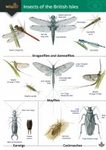![Insects and Their Beneficial Microbes Insects and Their Beneficial Microbes]()
Click to have a closer look
About this book
Customer reviews
Biography
Related titles
About this book
Insects and Their Beneficial Microbes is an authoritative and accessible synthesis of insect associations with beneficial microorganisms. Angela Douglas distils the vast literature in entomology and microbiology, as well as the burgeoning microbiome literature, to explore the full scope of insect-microbial interactions and their applications to real-world problems in agriculture and medicine.
Douglas investigates how insects acquire and support their microbial partners, and examines how microorganisms contribute to insect nutrition, the defence against natural enemies, and the detoxification of natural allelochemicals and chemical insecticides. She analyzes how beneficial microbes can be harnessed to solve real-world problems in insect pest management, including strategies to suppress the transmission of viruses and microbial disease agents by mosquitoes and other insects. She also addresses the use of insects as biomedical models for effective microbial therapies treating a range of chronic human diseases and considers how knowledge of insect-microbial interactions can promote the health of beneficial insects, especially in the context of environmental pollutants and climate change.
Insects and Their Beneficial Microbes provides a much-needed conceptual framework for the growing discipline of insect-microbial interactions and offers a wealth of insights into insect symbioses from molecular, physiological, ecological, and evolutionary perspectives.
Customer Reviews
Biography
Angela E. Douglas is the Emerita Daljit S. and Elaine Sarkaria Professor of Insect Physiology and Toxicology at Cornell University. Her books include Fundamentals of Microbiome Science and The Symbiotic Habit (both Princeton).
By: Angela E Douglas(Author)
331 pages, 70 b/w illustrations, 13 tables
"The study of insect-microbe interactions has had a major impact on our understanding of symbiosis. In this book, Angela Douglas weaves together the history of the field with an up-to-date synthesis of the numerous and varied interactions that microbes take up with insects, along with a road map of where the field is going. This is an important contribution for those new to insect-microbe interactions and for experts looking to expand their knowledge."
– John McCutcheon, Arizona State University
"With its expansive scope, sound scholarship, and forward-thinking approach, Insects and Their Beneficial Microbes makes a significant addition to the field. Graduate and postgraduate researchers alike will benefit from the book's conceptual and experimental framework."
– Hassan Salem, Max Planck Institute for Biology Tübingen

































